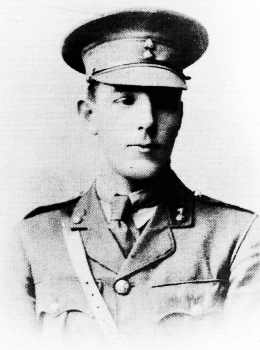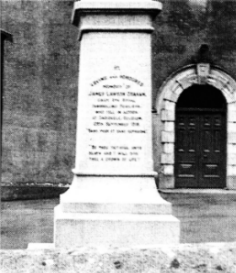A bitter sweet occasion for Boardmills man
whose son fell in Belgium

THE eleventh hour of the eleventh day of 1918's eleventh month must have been a bitter sweet occasion of the most tragic kind for Boardmills man Samuel Graham.
As the Armistice which marked the end of the First World War's awful carnage came into effect he knew the cessation of hostilities meant his son Joseph would return from the battlefields of Europe unscathed along with his daughter Edith who was a member of the army's Nursing Corps.
However, he also had to face the fact the guns with which British and German forces had pounded each other for so long had fallen silent just seven short weeks too late to save the life of his other son.
Lieutenant James Lawson Graham had become one of 'the fallen' in Belgium on September 29.
As time went on memorials to those killed in the 'the war to end all wars' became a common sight.
Boardmills was no exception and an obelisk commemorating James Lawson was erected at the village's Second Presbyterian Church by his Uncle Dr. James Graham.
Dr. Graham who was Belfast Coroner from 1905 until his death in 1932 travelled to the church's Remembrance Service from his home in Helens Bay every year, paying homage to his nephew by laying a wreath on the Memorial.
Edith Graham, meanwhile, married a local farmer named Bertie Petticrew and the couple had one son called Robert.
In 1966 Robert married his wife Joan (nee Shilliday) and their son Jonathan became the eighth generation of Lieutenant Graham's family to be born at Boardmills.
 He
was also the last of the line to be christened in Second
Boardmills Church. Jonathan is now the owner of a gold
sovereign carried throughout the First World War by his
Great Uncle. His mother, local historian Joan Petticrew, has
marked Sunday's 89th anniversary of the Armistice by
researching Lawson Graham's army career.
He
was also the last of the line to be christened in Second
Boardmills Church. Jonathan is now the owner of a gold
sovereign carried throughout the First World War by his
Great Uncle. His mother, local historian Joan Petticrew, has
marked Sunday's 89th anniversary of the Armistice by
researching Lawson Graham's army career.
Visits to the Public Records Office on Balmoral Avenue and a telephone call to The Inniskillings Museum in Enniskillen revealed he was a Belfast businessman until he joined the military as World War One began in 1914.
He worked his way through the ranks becoming a Second Lieutenant with the Ninth Inniskillings.
Joan also discovered a letter detailing the circumstances surrounding his death sent to his father by Army Chaplain Rev. W G. Murphy.
The clergyman wrote: "Your son fell in action on the morning of Sunday September 29.
"We moved up to the attack and it was as he was leading his company forward very gallantly he fell mortally wounded by a machine gun bullet.
"He was one of the best among our officers and a very good man personally.
"We all loved him and feel a great sense of loss. His body was sent back to be buried well behind our lines which were pushing forward at this time.
"He helped and helped most signally to win an advance that will be memorable in this division and will do much to hasten the end of the war."
Lieutenant Graham's Commanding Officer Lieutenant Colonel R.S. Knox said he died "the most gallant death a soldier could die, leading his company in the forefront of the advance.
"He was liked exceedingly by his men with whom he was always on the best of terms and had the rare gift of inspiring confidence in them," the Lieutenant Colonel concluded.
Ulster Star
09/11/2007

